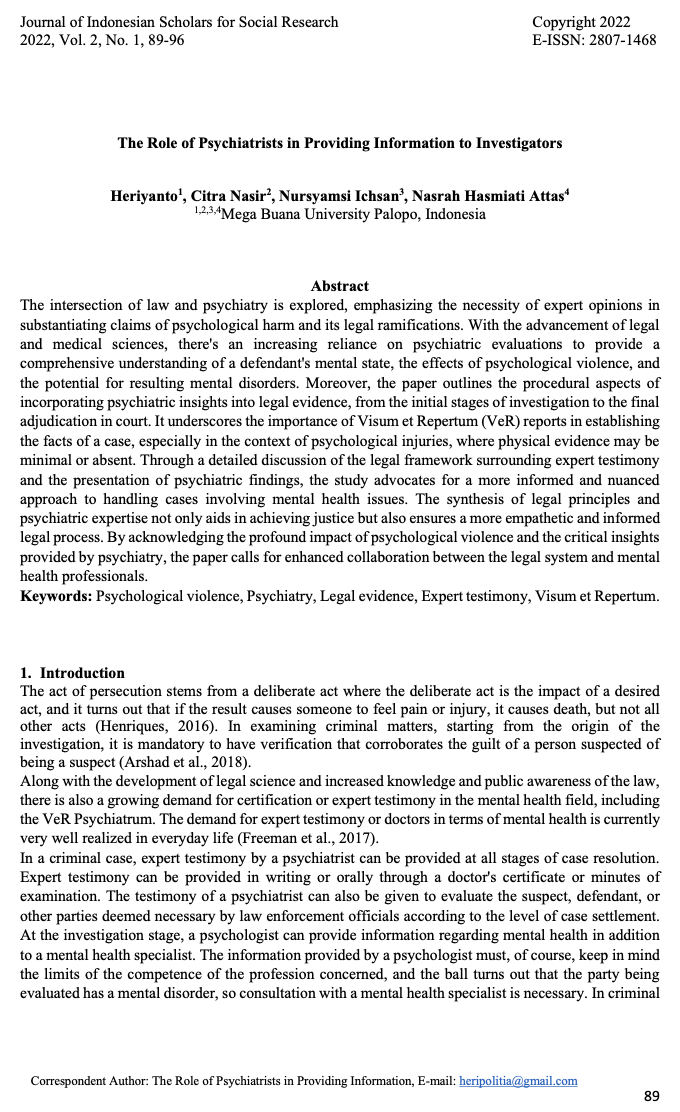The Role of Psychiatrists in Providing Information to Investigators
Keywords:
Psychological violenceAbstract
The intersection of law and psychiatry is explored, emphasizing the necessity of expert opinions in substantiating claims of psychological harm and its legal ramifications. With the advancement of legal and medical sciences, there's an increasing reliance on psychiatric evaluations to provide a comprehensive understanding of a defendant's mental state, the effects of psychological violence, and the potential for resulting mental disorders. Moreover, the paper outlines the procedural aspects of incorporating psychiatric insights into legal evidence, from the initial stages of investigation to the final adjudication in court. It underscores the importance of Visum et Repertum (VeR) reports in establishing the facts of a case, especially in the context of psychological injuries, where physical evidence may be minimal or absent. Through a detailed discussion of the legal framework surrounding expert testimony and the presentation of psychiatric findings, the study advocates for a more informed and nuanced approach to handling cases involving mental health issues. The synthesis of legal principles and psychiatric expertise not only aids in achieving justice but also ensures a more empathetic and informed legal process. By acknowledging the profound impact of psychological violence and the critical insights provided by psychiatry, the paper calls for enhanced collaboration between the legal system and mental health professionals.
Downloads
References
Arshad, H., Jantan, A. Bin, & Abiodun, O. I. (2018). Digital Forensics: Review of issues in scientific validation of digital evidence. Journal of Information Processing Systems, 14(2).
Eddy O.S Hiariej, (2012), Teori & hukum pembuktian, Erlangga, Jakarta. Forensic Psychiatry. In: Synopsis of Psychiatry. Behavior Science Clinil
Freeman, D., Reeve, S., Robinson, A., Ehlers, A., Clark, D., Spanlang, B., & Slater, M. (2017). Virtual reality in the assessment, understanding, and treatment of mental health disorders. Psychological Medicine, 47(14), 2393–2400.
Hardesty, J. L., & Ogolsky, B. G. (2020). A socioecological perspective on intimate partner violence research: A decade in review. Journal of Marriage and Family, 82(1), 454–477.
Henriques, R. (2016). An independent review of the Metropolitan Police Service’s handling of non-recent sexual offence investigations alleged against persons of public prominence. London: Metropolitan Police Service.
Idris AM. Tjiptomartono AL. (2008), Penerapan ilmu kedokteran forensik dalam proses penyidikan, Sagung Seto, Jakarta. Kalapan, (1994), HI & Sadock Bj, Psychiatry. VII ed. Baltimore. Williams& Wilkins. Pp.1717-1188.
Pill, N., Day, A., & Mildred, H. (2017). Trauma responses to intimate partner violence: A review of current knowledge. Aggression and Violent Behavior, 34, 178–184.
Saanin, Hasan Basri. (1982). Psikiater dan pengadilan. Bandung: Ghalia Indonesia.
Sasangka, Hari., & Rosita, Lily. (2003). Hukum pembuktian dalam perkara pidana. Bandung: Mandar Maju.
Soeparmono, R. (2016). Keterangan ahli & visum et repertum dalam aspek hukum acara pidana. Bandung: Mandar Maju.
Sofyan, Andi., & Asis, Abdul. (2014). Hukum Acara Pidana. Jakarta: P.T. Tambra Raya.
Trabold, N., McMahon, J., Alsobrooks, S., Whitney, S., & Mittal, M. (2020). A systematic review of intimate partner violence interventions: State of the field and implications for practitioners. Trauma, Violence, & Abuse, 21(2), 311–325.
Undang-Undang Nomor 23 Tahun 2004, Penghapusan Kekerasan Dalam Rumah Tangga.
Undang-Undang Nomor 8 Tahun 1981, Hukum Acara Pidana.
Waluyo, Bambang. (2014). Victimologi perlindungan saksi dan korban. Jakarta:SinarGrafika.

Downloads
Published
How to Cite
Issue
Section
License
Copyright (c) 2022 Heriyanto, Nursyamsi Ichsan, Nasrah Hasmiati Attas

This work is licensed under a Creative Commons Attribution-ShareAlike 4.0 International License.
Authors who publish in this journal agree to the following conditions:
- Authors retain the copyright of their work while granting the journal the right of first publication. The published work is licensed under the Attribution-ShareAlike 4.0 International (CC BY-SA 4.0) license (https://creativecommons.org/licenses/by-sa/4.0/). This license permits others to share and adapt the work, provided that proper credit is given to the original author(s) and the journal as the initial publisher.
- Authors may establish separate, additional agreements for the non-exclusive distribution of their published work (e.g., depositing it in an institutional repository or including it in a book), as long as they acknowledge its original publication in this journal.
- Authors must sign a copyright transfer agreement once they have reviewed and approved the final proof provided by JISSR before publication.









